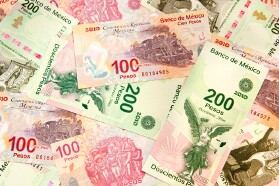The Mexican peso is falling against the US dollar and other G10 currency competitors on Tuesday after the central bank surprised financial markets and cut interest rates. The peso weakened even further as officials are sounding the alarm about a significant crash in Latin Americaâs second-largest economy.
On Tuesday, Banxico slashed the overnight rate by 50 basis points to 6% in response to a widely anticipated recession this year. This is the third rate cut so far this year.
The central bank hinted that further action is expected amid âmajor challenges arise for monetary policy and the economy in generalâ due to the coronavirus pandemic. The Governing Board alluded to âadditional measuresâ that would involve strengthening credit markets and pumping liquidity into the financial system.
In November, the central bank maintained one of the highest interest rates in the world at 7.5%. However, the negative effects from COVID-19 are weighing on economic activity, and Banxico forecasts that the gross domestic product could contract more than 5% in the first half of 2020. Last year, the economy shrank for the first time in a decade.
Officials said in a statement:
It is estimated that the negative effects on domestic economic activity resulting from the pandemic may lead to an important contraction of economic activity in Mexico during the first half of the year. Although the magnitude and duration of the effects of the pandemic are still unknown, and since available information is still limited, initial estimates suggest that during the first half of 2020 GDP could fall more than 5% as compared to the same period of the previous year. It is clear that slack conditions are widening considerably, in a context in which the balance of risks for growth is significantly biased to the downside
According to a Reuters survey of economists, Mexicoâs inflation rate is expected to have eased considerably in the first half of April. The poll suggests its mid-month inflation rate fell 0.63%, reducing the annualized figure to 2.16%. Last month, the mid-March annualized inflation rate clocked in at 3.71%. The official numbers will be published on Thursday.
Elsewhere on the data front, February retail sales will be released on Thursday, and analysts project a decline of 0.8%. The March unemployment rate will be announced on Monday, and the median estimate suggests a 0.3% jump to 3.9%.
President Andres Manuel Lopez Obrador has attempted to mitigate a financial crisis by unleashing a stimulus package that he says would create two million new jobs in the next nine months. The relief package includes low-interest loans to small businesses, support for low-income mortgage borrowers, and tightening of public sector budgets. AMLO is also extending a $13.5 billion investment lifeline to the energy sector. The president noted that he wants to take a different approach to stimulus by giving it to âthe people of Mexicoâ rather than large companies and big banks.
The USD/MXN currency pair surged 1.58% to 24.4412, from an opening of 24.0630, at 18:57 GMT on Tuesday. The EUR/MXN soared 1.63% to 26.5425, from an opening of 26.1151.
If you have any questions, comments, or opinions regarding the Mexican Peso, feel free to post them using the commentary form below.
